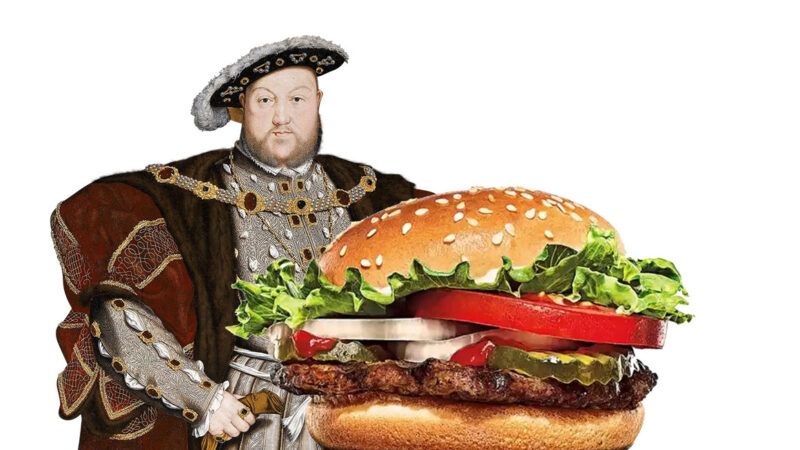You Can Eat Better Than King Henry VIII, Thanks to Globalization and Burger King
Thanks to globalization, we plebes can pay just $6.49 for a whole Whopper meal fit for a 16th-century king.

When it comes to fresh, tasty food, who had it better? Henry VIII, king of England from 1509 to 1547, or you and me going to Burger King with $10 in our pockets?
"The Burger King Whopper is actually a combination of foods from different parts of the world that wouldn't have come together for most of human history," says historian (and Reason contributor) Katrina Gulliver. And Henry VIII "would never have seen a potato" either, without which a delicious side of fries would be impossible.
Hank died in 1547. Potatoes didn't get to Europe from the New World until 1570. It took another couple of centuries for them to finally replace the turnip and rutabaga in English cooking. But once they did, the victory was decisive. That's why you never hear, "You want rutabagas with that?"
The tomato's story is similar. It arrived in Europe in the early 1500s, with Spanish conquistadors returning fresh (enough) from their conquesting. Because the tomato wasn't part of Henry VIII's feasts, neither was ketchup—or at least not the kind we're used to. "Ketchup earlier in England was made from mushrooms," says Gulliver. "It was more of a sauce." But mustard they had. It had been around since Roman times.
Pickling also had been around for ages, which was good, because there were no refrigerators. And since England grew cucumbers, Henry would have had pickles aplenty. Ditto lettuce and onions. But at the time, vegetables were considered lowly peasant food, although Henry bucked tradition by eating raw fruit—something that had been considered low-class.
What about the Whopper bun? Bread was, of course, a British staple. But fluffy bun bread requires fine white flour, which wasn't developed until the late 19th century. "And it was/is a bit of a nutritional tradeoff," Gulliver notes, because "it cut out thiamin and other nutrients. This is why the USDA requires flour to be enriched."
As for sesame seeds, they are one of the oldest cultivated foods anywhere; King Tut was buried with baskets of them. But it is unclear when they sprinkled into Britain.
So let's get to the meat of the matter: Would Henry have been able to enjoy a delicious, flame-broiled burger? Yes—with some difficulty (not his, of course). If the king wanted ground beef, someone would have had to force it through a sieve—hence the term forcemeat—as the meat grinder had yet to be invented.
Henry's meat was fresh, not preserved. That was a luxury. On this point, at last, Henry bests Burger King, whose patties are frozen. Then again, the modern day "cold chain"—refrigeration from warehouse to truck to restaurant—is a marvel in itself.
Unlike us Burger King diners, Henry would also have had a wide choice of other meats, including whale, porpoise, and swan. (That's when you really need ketchup.)
King Henry enjoyed a couple of other perks unavailable to Burger King clientele, such as choosing the people who ate around him and being the sole fork user at the table. And he got to behead anyone who annoyed him, which most fast food franchises frown upon. Officially, anyway.
Our 21st century perks, by contrast, include extra pepper for free. That was unheard of in Henry's time, when spices were exceedingly expensive. Henry not only paid dearly for seasonings; he also had to employ about 200 kitchen staffers, including boys who sat by the fire and turned the spit. In the intense heat, they would strip off their clothes—until Henry issued an order forbidding them to be "naked or in garments of such vileness as they do now." (That's probably a requirement at Burger King too.)
His Highness had to feed his whole court two meals a day, which required an army of hunters, chefs, spit turners, and hangers-on. And he didn't even get to eat a bun, tomato, or fry.
Today, for just $6.49, we plebes can get a whole Whopper meal, including a bubbly drink sweetened with another treat that was rare in Henry's realm: sugar.
We got to this point due to exploration, exploitation, bravery, knavery, innovation, and, of course, trade. Lots and lots of trade.
"The Burger King meal really is a triumph of globalization," says Gulliver. Imagine what Henry would think of the fast food chain's famous paper crowns.
